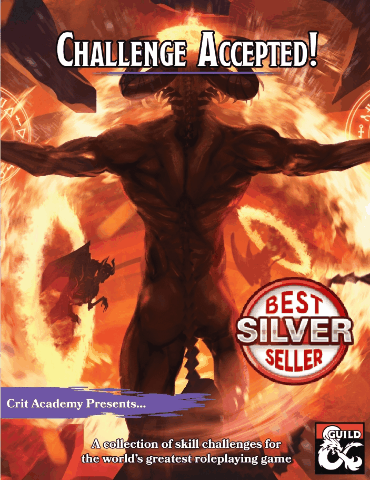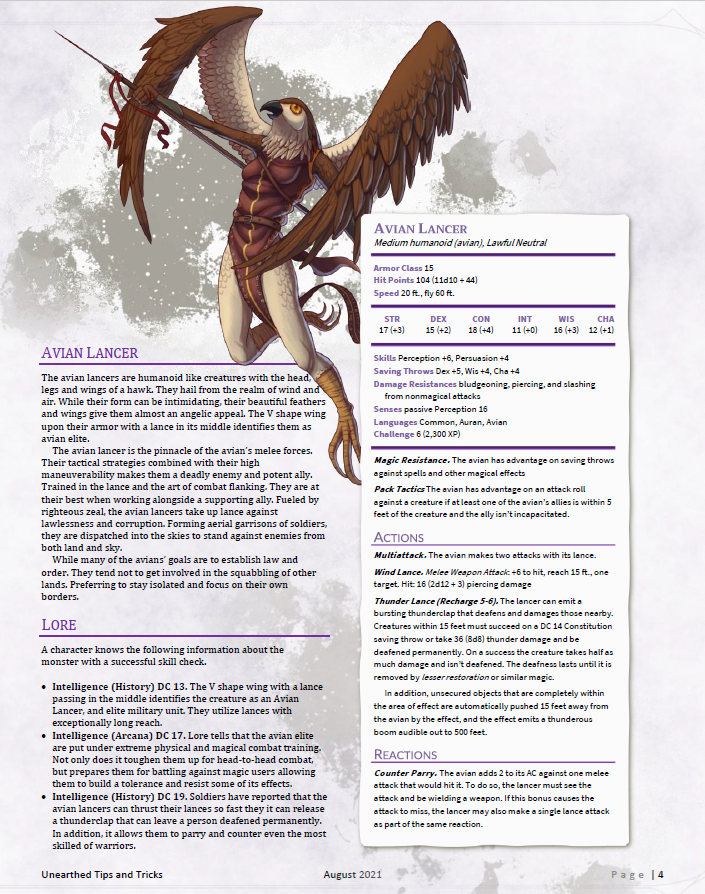How to Run Hardcore Combat in Dungeons & Dragons with Grit & Glory Advanced Player's Guide
- Justin Handlin

- Sep 18, 2021
- 7 min read
Do you want to be a better D&D Player? Do you want to become an amazing Dungeon Master? Then subscribe to our YouTube to get notified when we publish new D&D Tips and Tricks videos
Brace Yourself…
From project lead Apostol Aostolov and a talented community of DMs we discuss Grit & Glory!
For decades, running realistic campaigns using the world's greatest role-playing game has been an impossible feat. Previous editions showered players with supernatural abilities and magic items until only monsters of legend present a formidable challenge.
In this episode, we discuss Grit and Glory, an Advanced Player's Guide to low fantasy and expanded combat, equipment, attrition, and recovery rules that focus on gritty gameplay.
Sign Up for our newsletter to get a FREE copy of our best-selling D&D Supplement: Challenge Accepted. You will also be entered to win our weekly RPG PhatLoot Giveaways!
Make sure to subscribe to our newsletter so we can help you on your future adventures. Newsletter subscribers are also entered to win cool prizes each and every week. Check out our fellowship members for more great content. Visit our Youtube channel for our show episodes, actual play episodes, and our tips & tricks videos. Support us on Patreon to get weekly Dungeons and Dragons loot!
Dungeons & Dragons 5th Edition is a welcome break from tradition. The bounded accuracy, reasonable power curve, and flexible core rules need only a few changes to allow for campaigns where players struggle to survive and face the unexpected consequences of combat.
Grit and Glory is your Advanced Player's Guide to low fantasy and historic roleplaying. This book contains popular house rules and expanded combat, equipment, attrition, and recovery rules that focus on realism and lethality.
Grit and Glory is intended for campaigns where players and opponents are made using similar rules. A perfect example of what these rules do best are the human-centric and low magic worlds of Game of Thrones and Conan the Barbarian. While these rules support traditional dungeon delving, monsters that scale far beyond human capabilities are dreadful encounters that can make or break your players. If you are looking for a survival and horror fantasy like Dark Souls or Cthulhu Mythos, you can challenge your players with uncompromising difficulty and attrition.
These rules may appear overwhelming at first but all rules are modular and can be introduced one by one into your game. Start with those that empower your players such as Combat Options and Realistic Equipment, and slowly raise the stakes by bringing new Recovery and Wounds mechanics to your game. Wounds and Recovery mechanics are best suited for campaigns starting at level 3-5 and can be very lethal at lower levels.
Join us, at 7pm Eastern 9/19/20 as we delve into this fantastic and free product!
Character Concept:
Wing of the Wind, Female Tabaxi
Description: She stands about 7'2" and wears a shirt that is too small, revealing a thick black coat with a silver streak in it. Her tail is missing a patch of fur and appears burned and disfigured. Her eyes, though not visible through her cowl, are amber.
Personality: Cocky and sure of herself, she believes she is the best artisan sculptor born in recent years. She does not trust anyone and sleeps with one eye open. Which is necessary when she takes four to five naps a day.
History: A passing artist inspired her into the art of sculpting. She has chosen to use the inheritance that was left to her travels and personal lessons from some of the best. She took up adventuring to seek new works of art and inspiration.
Motivation: Wing of the Wind hopes to one day find the perfect place to set up her own art studio. Not only to do her own work but to teach others and spread her craft to any who are interested.
Monster Variant:
Ultimas Primal
Origin: Wereboar
Lost Features: Maul, charge, tusk, hybrid form,
New features:
Vulnerabilities: adamantine weapons, acid
Condition Immunities. Charmed, exhaustion, frightened, paralyzed, petrified, poisoned
False Appearance. While the ultimas primal is transformed it is indistinguishable from an artificer's wagon.
When it uses its shapechanger power it can turn into battle form or travel form. While in travel form it gains a +30 to its speed.
Overrun (Travel Only). If the Ultimas Primal moves at least 15 feet in a straight line toward a target and then hits it with its ram attack on the same turn, the target takes an extra 7 (2d6) bludgeoning damage. If the target is a creature, it must succeed on a DC 16 Strength saving throw or be knocked prone.
Actions:
Arcane Axe. Melee Weapon Attack: +5 to hit, reach 5 feet., one target. Hit: 9 (1d12 +3) radiant damage.
Arcane Blaster. Ranged Weapon Attack: + to hit, range 90/180 ft., one target. Hit: 10 (3d6) radiant damage.
Leadership (Recharge after a short or Long Rest). For 1 minute, the ultimas can utter a command or warning whenever a nonhostile creature that it can see within 30 feet of it makes an attack roll or saving throw. The creature can add a d4 to its roll provided it can hear and understand the ultimas. A creature can benefit from only one Leadership die at a time. This effect ends if the Ultimas is incapacitated.
Reactions:
Run Over (Travel Only). Ultimas Primal targets one prone creature within 20 feet of it. The target must succeed on a DC 16 Dexterity saving throw or take 7 (2d6) bludgeoning damage. Ultimas can also move up to half its movement speed.
Encounter:
The characters are tasked by Anastrya Wing, a half-elf veteran to delve into a thick swampy marsh. The smell of rotting carcasses and foliage fills the air. Deep in the marsh tower lies the Hollow Verdant Tower. A character who succeeds on a DC 16 History check knows that the tower was built in this marsh by elves centuries ago. Now it is the spawning ground of demons. Anaystrya needs the characters to map the area thoroughly, especially monster lairs and traps. She iterated “Don’t get in over your heads – we’re planning on sending a whole battalion through to deal with inhabitants, but we need the intel first”.
The marsh area is filled with vile creatures such as gravebears, grungar, tainted treants and more. Many have lairs and territories that they are very protective of. The tower itself houses a doorway to the demon’s home plane. While there is a variety of different demon types in the tower. There should be more than one that is terrible and not something the characters should be able to defeat with blades and spells. The balor, marilith and a glabrezu to name a few. This should require that the characters focus on recon and stealth. Locating opportunities to distract or avoid the dangerous enemies.
If you want to take it a step further. You can add a twist by giving one of the PCs a different separate side mission they are trying to accomplish. This is great for rogues and characters with the criminal background.
Magic Item:
Emerald of the Liv Blessing Rune
Wondrous item, very rare (requires attunement)
This flower-shaped stone measures about two inches on each side and half an inch thick with a liv rune carved into it. The gem is translucent and radiates a faint emerald green light from its core. The emerald has the following properties, which work only while it’s on your person.
Gust. You can cast the infestation cantrip(XGtE).
Nature’s Ally. You have advantage on all saves against poison and disease effects, magical or otherwise.
Nature’s Bounty. You can cast the goodberry spell without expending a spell slot. You can’t use this feature again until the next dawn.
Gift of Wild. You can transfer the emerald’s magic to a nonmagical item-a weapon or a suit of armor by
tracing the live rune there with your finger. The transfer takes 8 hours of work that requires the two items to be within 5 feet of each other. In the end, the emerald is destroyed, and the rune appears as an emerald green color on the chosen item, which gains a benefit based on its form:
Weapon. The weapon is now a very rare magic weapon that requires attunement. Nature’s tendril vines sprout from your weapon on occasion and bind your foe. When you roll a critical hit on a creature, the creature takes an extra 3d6 piercing damage and becomes restrained. A creature restrained by the vines can use its action to make a DC 15 Strength check. On a success, it frees itself.
Armor. The piece of armor is now a very rare magic item that requires attunement. The armor acquires 1d4 charges. You can use an action to spend a charge and release an explosion of grass, vines, branches, and other vegetation that weaves themselves over your body into a temporary armor for up to 1 minute. You can use a bonus action to end this effect. You gain a +1 bonus to your Armor Class and gain 4d4 + 3 temporary hit points. While wearing this nature armor, if a creature hits you with a melee attack within 5 feet of you they take 1d4 piercing damage.
Additionally, when you use the Attack action to grapple a creature, or a creature grapples you, the target takes 1d4 piercing damage.
The armor regains all expended charges daily at dawn. If you expend the armor’s last charges, roll a d20. On a 1, the armor rune is consumed and the armor becomes mundane.
Dungeon Master Tip:
Taking a Breather
Sometimes our characters are in a situation where an hour-long short rest isn’t possible but they have taken plenty of damage from ongoing encounters. This is extremely common in dungeons or while in an enemy fortress. Taking a breather is a short period of rest that allows the characters to recover hit points, without regaining additional recharge features, such as a fighter’s action surge.
This is perfect for sprints of encounter after encounter. During a breather, a character can spend one Hit Die for healing. You roll the die and add your Constitution modifier to it and regain hit points equal to the total.
This really is perfect as it doesn’t give them the full benefits of a short-rest, in fact, it's significantly limited since they can only spend one Hit Die per breather. But, the more enemies they avoid, the more they can spend and recover for the next engagement. I think this adds a fantastic layer to the tactics of the game.
Player Tip: Don’t be a Dick
Handling Superior Forces (The Art of War for D&D Players)
There are many times when you need to defeat a force that can outfight
you in a straight-pitched battle. Assuming you are unable to sneak around
the enemy or avoid them in some other way, there are several strategies
you can use:
A well-executed surprise attack can effectively augment your offensive power.
Weakening an enemy force by separation is also very effective.
Good tactical positioning can enable you to destroy a numerically superior force.
Hit-and-run attacks can wear down a numerically superior force.
The clever use of magic, especially control magic, can quickly redraw the battlefield in your favor.
If you enjoy the show and want to support us, visit us at www.critacademy.com. Follow us on social media, join us on discord, youtube, and leave us a review.
Keep your blades sharp and spells prepared heroes!
*Crit Academy is an Affiliate of Amazon, DMsguild and DriveThruRPG*
































Comments